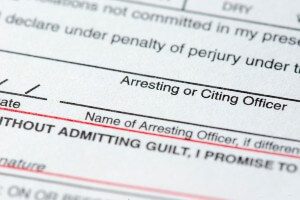 Having a prior driving conviction, no matter how minor, can not only affect your insurance rates, but it could also impact your chances at recovering damages in a car accident lawsuit. This is why is it important to have an experienced lawyer by your side to help navigate the legal process for you and obtain the compensation you need following an accident and subsequent damages.
Having a prior driving conviction, no matter how minor, can not only affect your insurance rates, but it could also impact your chances at recovering damages in a car accident lawsuit. This is why is it important to have an experienced lawyer by your side to help navigate the legal process for you and obtain the compensation you need following an accident and subsequent damages.
Below, our legal team further explores certain driving convictions that can be used against you in a personal injury case. If you have a prior conviction and need help taking legal action, we are here to help. An initial consultation is completely free and confidential without any obligation to hire our firm.
Filing a Lawsuit With a Prior Conviction
When someone is charged with a driving conviction from a car accident, they generally do not think about how it could potentially affect a future claim. He or she may even assume that a Highway Traffic Act conviction for a driving offense, is separate from a lawsuit. However, in most cases, that is not true.
A driving conviction can affect your right to claim accident benefits in civil court. Failure to stop at a stop sign or speeding are considered traffic violations under the Highway Traffic Act of Ontario. For instance, if you were previously issued a traffic citation for speeding, you would likely have more difficulty establishing that you were not driving dangerously at the time of the accident.
It is important to treat prior convictions seriously if you plan to seek compensation in a lawsuit. Should the case not settle before going to court, a judge or jury would determine whether you are at fault and the amount of damages, if any, you would be compensated for.
Driving Convictions in Ontario
Everyone is expected to drive in a safe and responsible manner. Not knowing or following the rules of the road means you are putting yourself and others at risk of an accident. This risk also includes getting a traffic or driving conviction. In Ontario, driving convictions range from minor, major and serious.
Minor driving convictions generally include:
- Speeding
- Failing to signal
- Following too closely
- Failing to wear a seatbelt
- Failing to yield the right of way
- Not obeying traffic signs
Major traffic convictions can include:
- Driving while distracted
- Failing to report an accident
- Driving without insurance
- Excessively speeding
These convictions are also in place to help protect vulnerable road users, such as children. Examples include failing to stop for a school bus and driving over the posted speed limit in a school zone.
Other, more serious convictions would include:
- Driving while intoxicated
- Careless or dangerous driving
- Racing or stunt driving
- Failing to remain at the scene
Advantages of Seeking Legal Help
If you have a driving conviction and are looking to file a car accident lawsuit, we recommend seeking legal help as soon as possible. Make sure to be honest when discussing your conviction with your lawyer.
While it may seem embarrassing to admit to past convictions, keep in mind that your lawyer will conduct a detailed investigation and will likely uncover these convictions on his or her own.
It is also important to let the other party or parties involved know. You do not want to be seen as dishonest, especially during settlement negotiations or cross examination. Credibility is everything in a lawsuit.
Reach Out for a Free Case Evaluation
Learn more about your rights in a free case evaluation with a reputable Windsor car accident lawyer from our firm today. We are prepared to answer any questions you may have about the legal process and discuss your eligibility for compensation in a car accident lawsuit.
You are not obligated to retain our services after meeting with us and you pay nothing up front. We only get paid if we help you obtain a recovery.
Greg Monforton & Partners. Free Consultations. Ph: (866) 320-4770.

